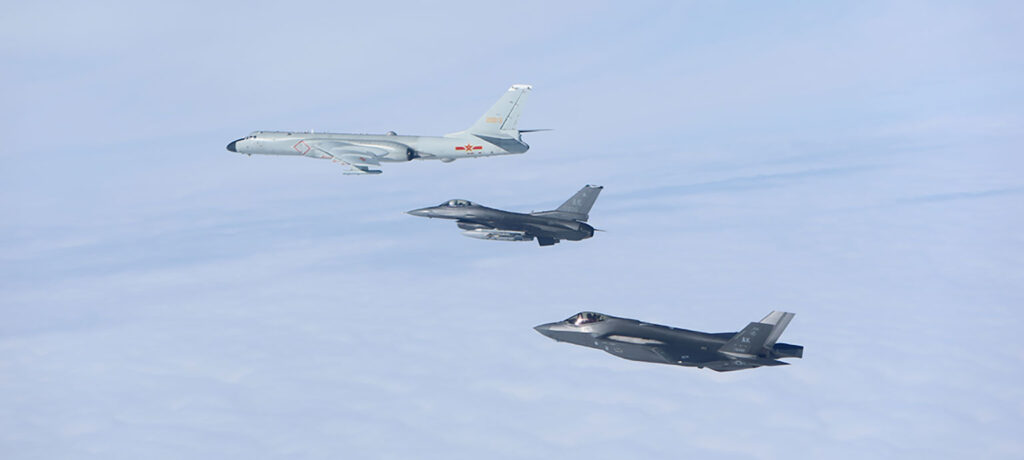North American Aerospace Defense Command fighter aircraft intercept a Chinese H-6 bomber off the coast of Alaska in July 2024. Two of the Chinese bombers were flying with two Russian bombers near Alaska in a sign of increasing Arctic cooperation between Beijing and Moscow. NORTH AMERICAN AEROSPACE DEFENSE COMMAND
REUTERS
The United States is watching growing cooperation between the People’s Republic of China (PRC) and Russia in the Arctic closely, and some of their recent military collaboration in the region sends “concerning signals,” the U.S. Arctic ambassador said. The PRC and Russia have stepped up military cooperation in the Arctic while deepening overall ties in recent years that include the PRC supplying Moscow with dual-use goods despite Western sanctions on Russia over the war in Ukraine.
Russia and the United States are among eight countries with territory in the resource-rich Arctic. The PRC calls itself a “near-Arctic” state and wants to create a Polar Silk Road in the Arctic, a new shipping route as the polar ice sheet recedes with rising temperatures. Michael Sfraga, the United States’ first ambassador-at-large for Arctic affairs, said the “frequency and the complexity” of recent military cooperation between Beijing and Moscow in the region sent “concerning signals.”
“The fact that they are working together in the Arctic has our attention,” Sfraga, who was sworn in as ambassador in October 2024, told Reuters. “We are being both vigilant and diligent about this. We’re watching very closely this evolution of their activity.”
He added that the cooperation “raises our radar, literally and figuratively.” Sfraga cited a joint exercise involving Chinese and Russian bombers off the coast of Alaska in July 2024, and Chinese and Russian coast guard ships sailing together through the Bering Strait in October 2024. He said these activities were conducted in international waters, in line with international law, but the fact that the bombers flew off the coast of Alaska raised concerns for U.S. security.
“We do need to think about security, heighten our own alliances, our own mutual defenses,” Sfraga said. “Alaska, the North American Arctic, is NATO’s western flank, and so we need to think about the Arctic that way.”
The activity was also a concern for U.S. allies as the Bering Strait and the Bering Sea give access to the North Pacific and South Pacific, he said. The Pentagon said in a report released in July 2024 that the growing alignment between the PRC and Russia in the Arctic was “a concern.”
The PRC and Russia are trying to develop Arctic shipping routes as Moscow seeks to deliver more oil and gas to China amid Western sanctions. Beijing is seeking an alternative shipping route to reduce its dependence on the Strait of Malacca. The Arctic also holds fossil fuels and minerals beneath the land and the seabed that could become more accessible with global warming.

